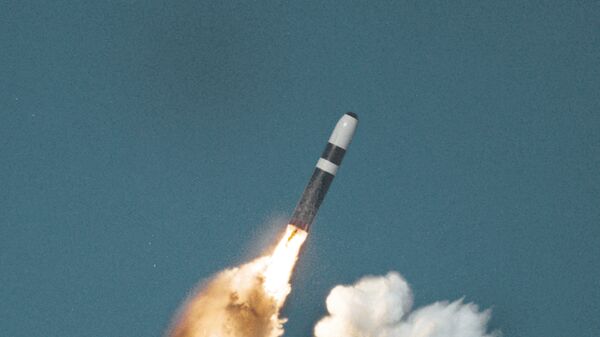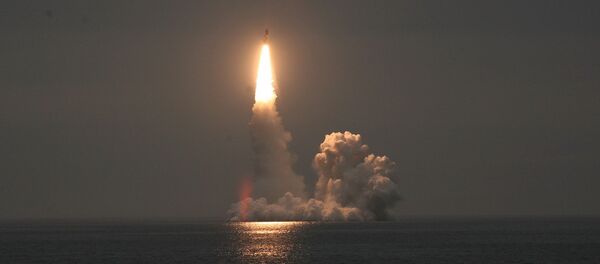EDINBURGH, December 16 (Sputnik), Mark Hirst – UK politicians are keeping their options open on whether to renew the UK’s nuclear weapons system known as Trident, Peter Burt, Research Manager with the Nuclear Information Service has told Sputnik.
“No party has yet formally committed to say how many new submarines they would build after the 2016 'Main Gate' decision and the main factor driving this decision will be economic, not political. In other words, the politicians are keeping their options open,” Burt told Sputnik.
“The political situation with regards to Trident is fluid and has been so for several years,” Burt added.
Burt’s comments came as Scotland’s First Minister Nicola Sturgeon, who leads the Scottish National Party (SNP), said she would only agree a deal with Labour or the Liberals if they agreed not to back the renewal of Trident following the 2015 UK General Election. The SNP have experienced a significant rise in electoral support despite losing September’s independence referendum, with the latest survey by YouGov showing the SNP on 50 per cent support. That could lead to them holding the balance of power at next May’s UK General Election if there is a hung parliament.
“Politicians tend to focus on the last election that they fought, rather than the next one, and there is a mistaken perception within each of the main parties that support for replacing Trident is a vote winner,” Burt told Sputnik. “In fact the SNP have convincingly proved that the opposite is true.
Asked by Sputnik if September’s referendum – in which Scots rejected independence from the UK – represented a lost opportunity for those opposed to nuclear weapons Burt responded, “The independence referendum campaign demonstrated the deep hostility to Trident in Scotland and also showed that, other than Faslane, there is nowhere else that the UK can base its nuclear weapons.
“Regardless of the outcome of the referendum, it's highly unlikely that issues of Scotland's constitutional status will not be debated again during the next 40 years — the planned lifetime of Trident — and this issue has not gone away,” Burt added.
Only the Conservatives are known to wholeheartedly support renewing Trident, estimated to cost $125billion (£80billion) but the party declined to comment on possible post-election negotiations over Trident.
Burt believes that in the event of a hung Parliament a coalition deal with the informal alliance of SNP, Plaid Cymru and Green Party MPs would give either Labour or Liberal Democrats the political cover they believe is necessary to drop the Trident renewal policy.
“Neither leaders of the Lib Dems nor Labour have shown particular enthusiasm for Trident replacement and there are strong elements in both parties calling for the cancellation of the programme,” Burt told Sputnik.
“An election result which led to either or both of these parties finding themselves in coalition with the SNP, Plaid Cymru, and/or the Green Party would probably provide Labour and the Lib Dems with a convenient excuse to drop a policy which has proved to be controversial, divisive, and unpopular,” Burt added.



